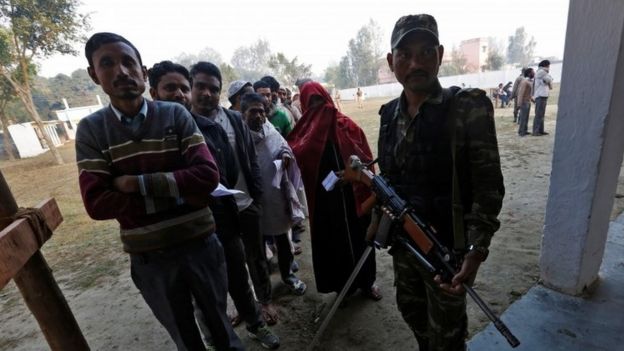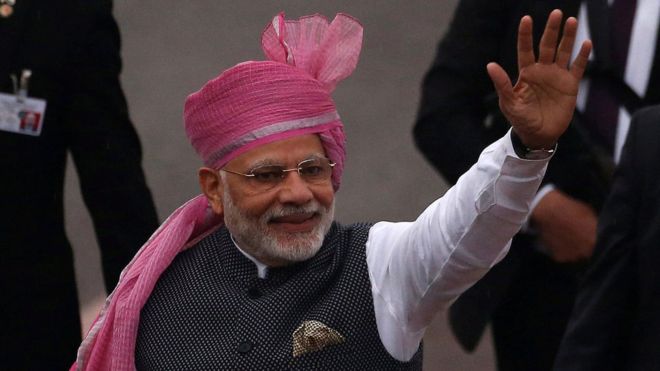India’s Prime Minister Narendra Modi is facing his biggest electoral test since gaining power, with voters heading to the polls in the country’s most populous state, Uttar Pradesh (UP).
Mr Modi took the northern state, which is home to over 200 million people, when he won the 2014 national election.
But the state election is being seen as a referendum on his decision to ban high value banknotes in the country.
The move led to a cash shortage, hurting individuals and businesses.
Voter turnout at the close of polls on Saturday was estimated to be about 63% of 26 million eligible voters. Polling was mostly orderly and peaceful, officials said.
 Image copyrightREUTERS
Image copyrightREUTERSVoting in the state is taking place in seven stages between Saturday and 8 March. Results are expected on 11 March.
Mr Modi’s Bharatiya Janata Party (BJP) is competing against an alliance of two young leaders – Rahul Gandhi of the Congress Party, and the state’s Chief Minister, Akhilesh Yadav.
Mr Yadav and his Samajwadi Party have criticised the prime minister’s currency reforms and predicted the BJP will be rejected by the voters.
“This result is going to give him [Mr Modi] a big jolt,” Mr Yadav said on Saturday in the state capital, Lucknow.
Mr Modi,for his part, has played a high profile role in the election campaign, urging voters to participate in a “huge festival of democracy”, while also encouraging them to reject corruption which he says is endemic in the state.
“Criminals rule the roost in UP,” the prime minister said. “There is so much lawlessness all around,” he said in a speech on Saturday.
Analysts say the election will be an important reflection of public opinion in relation to Mr Modi’s demonetisation policy.
Read more
- The election no one can afford to lose
- Currency move is ‘bad economics’
- How India’s currency ban is hurting the poor
The move to scrap 500 ($7.60) and 1,000 rupee notes in November was intended to crack down on corruption and so-called black money or illegal cash holdings.
However, the government has admitted that the withdrawal of high value banknotes, which was met with shock in India, has had an “adverse impact” on the economy.
Uttar Pradesh: India’s election behemoth
- Has the largest number of representatives in the Indian parliament
- If it was a country, would be in the world’s top six most populous
- The BJP won 71 out of 80 seats in UP up for grabs in the 2014 general election
- Contains the constituency of Amethi, held by the Nehru-Gandhi family since 1980
Mr Modi has defended the currency move, which he said was made in the interests of the poor.
He hopes a strong showing at the polls will strengthen his chances of a second term in 2019.
The polls currently suggest that the BJP is tied with Mr Yadav’s Samajwadi Party and Congress.



